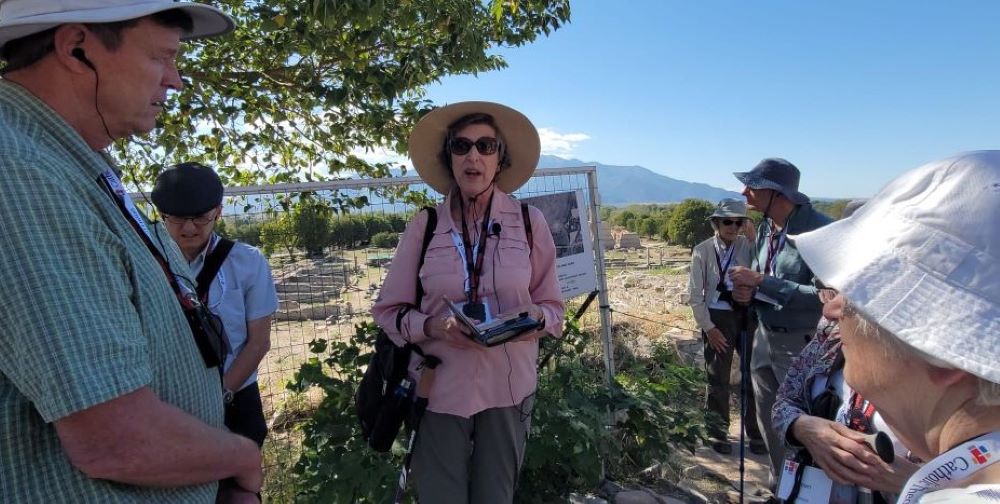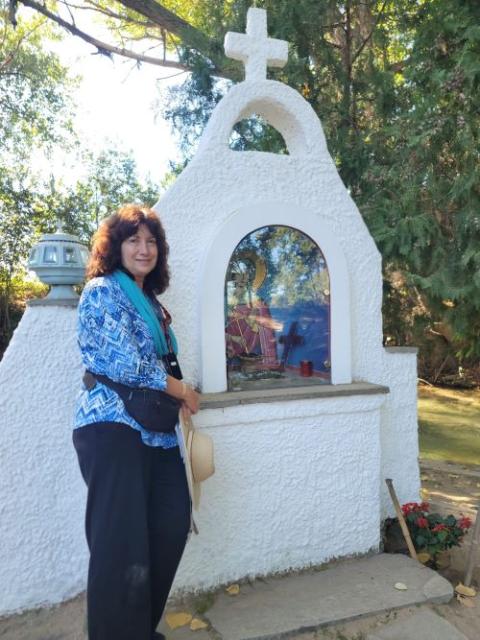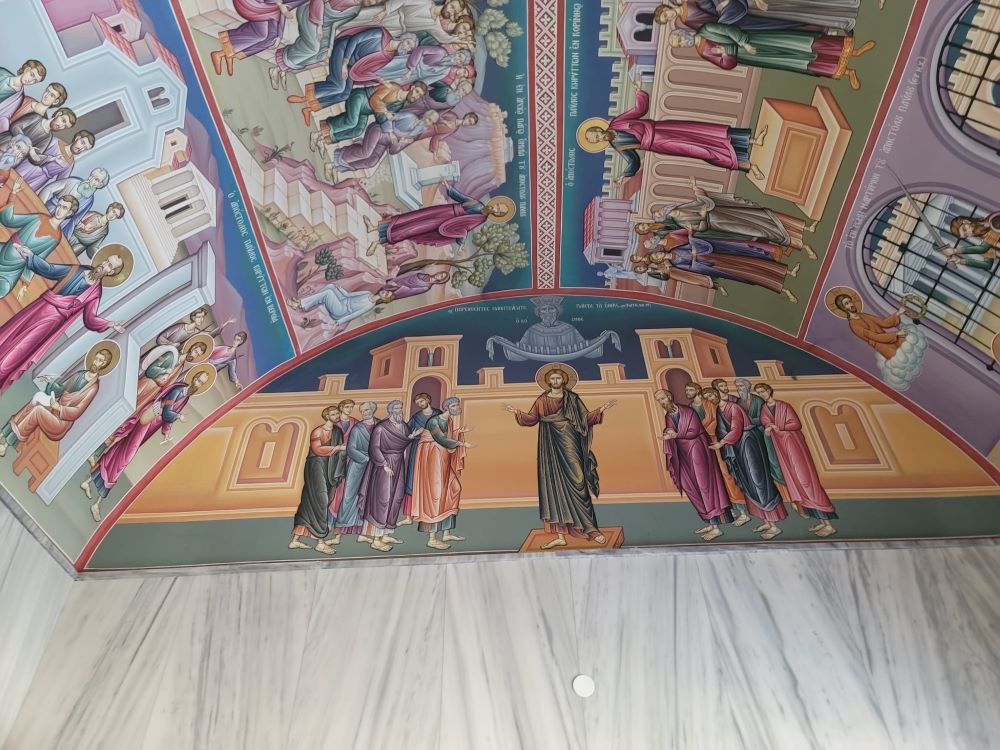
Sr. Barbara Reid, president of Catholic Theological Union and a Dominican of Grand Rapids, Michigan, talks to participants during a biblical study tour of Greece and Turkey, "In the Footsteps of St.Paul." Here she is near the entrance to the archeological site of ancient Philippi, where she explains how St. Paul honors many women who were leaders in the early Christian communities. (GSR photo/Gail DeGeorge)
Editor's note: Global Sisters Report Editor Emerita Gail DeGeorge recently participated in a biblical study tour to Greece and Turkey with Catholic Theological Union.
Halfway through the biblical study tour "In the Footsteps of St.Paul" with Catholic Theological Union, on our last day in Greece, I could feel my faith being restored.
My anger and frustration with the short-sightedness and exclusion by Pope Francis and the Catholic Church hierarchy in refusing to recognize the legitimate role of women as deacons — or even to bring up the matter for consideration at the second assembly of the synod on synodality — began to crystallize and be set apart. They are not forgotten, let me be clear. But those feelings are no longer an obstacle to my connection with God, with the messages of Jesus Christ about forgiveness and eternal life, and the guidance of the Holy Spirit.
Being immersed in the time of the early church for the past five days had, as I had hoped, reminded me of the basic tenets of our faith: before man's obsession with power and war (for these are the offspring of male-dominated institutions) corrupted and twisted the gospel of love, acceptance and peace preached by a man from Galilee who I and countless others believe was and is also the promised Christ, God among us.
When I saw the notice about a biblical study trip that follows the footsteps of St. Paul through Greece and Turkey, led by Catholic Theological Union President Sr. Barbara Reid, a renowned feminist theologian, I was instantly intrigued. I've always had a fascination with St. Paul — his role evangelizing the Gentiles, his journeys, and even being shipwrecked on the island of Malta, the homeland of my grandfather. Even as a young girl, I loved the readings of his letters during Mass. I would be so enthralled by the language in his instructions to early Christian communities that I would go home and write my own interpretations.

Gail DeGeorge poses near the brook where Lydia was said to have been baptized and where the tour group celebrated Mass. (Courtesy of Gail DeGeorge)
I also realized that the trip would take place in October, simultaneous with the long-awaited second assembly of the Synod on Synoldality (Oct. 4-27). At the time, it was widely anticipated that one of the issues most often cited by participants in the synod — the role of women in the church — would get a fuller discussion and hearing.
The request for women to again become deacons was raised by leaders of women's congregations at the International Union of Superiors General at their 2016 plenary during an audience with Pope Francis. There seems little contradiction and a great deal of evidence, presented by Sister Barbara, scholar Phyllis Zagano and others, that women held this role in the early church. The sister-leaders raised the question not because of a grab for power or just ecclesiastical equity, but because from their on-the-ground ministries, they saw that Catholics were having to forego sacraments and services because of the shortage of priests.
With the news of the decree to take the women deacons question off the table, I was dismayed and disappointed that we women should be so summarily dismissed. Pope Francis had met with leaders of women's ministries, including a representative of Discerning Women Deacons just before the synod opened, seemingly offering a ray of hope that this issue would be given due consideration. Instead, as too often is the case, women were invited to the door but not to cross the threshold.
So this time, why was I surprised? Perhaps because I dared to hope that Pope Francis would be different. That he would be strong enough to restore women to their rightful place in ministry and leadership in the church. That the pope who has appointed more women to key positions in the Vatican would be willing to withstand critics and do the right thing to preserve the church and usher it into a new era of vibrancy by allowing women to more fully use their gifts to serve its people.
Sadly the Catholic Church loses much of its moral authority when it contributes to a form of systemic misogyny by preventing women from more fully participating in Catholic Church decision-making leadership.
As the study tour by Sister Barbara unfolded, it was demonstrated time and again that this was not the case in early Christianity. On our first day at Lydia's Grove near Philippi, we were reminded that the woman who was a "dealer in purple cloth" — a member of the merchant class and a woman of independent means — and her household were the first to be baptized in Europe by Paul.
By the brook in which she and the others were said to be baptized, our 28-member group celebrated Mass, thanks to the two priests in our group. Sister Barbara addressed the group with a very meaningful message of us being in a "liminal space" during our time together in which "we can experience a close encounter with God of an unusual type."
Throughout the liturgy and our prayers on Oct. 7, we honored the spiritual significance of the feast of the Holy Rosary, and the commemoration of the one-year anniversary of the horrible Hamas attack on Israel, which provoked the terrible war that has taken the lives of so many Israelies and Palestinians.
I felt very connected to Lydia and the other women who Sister Barbara reminded us were instrumental in the "Jesus Movement" and who Paul repeatedly referred to as "co-workers" in the mission of evangelization. "It is important to notice that he is very laudatory to women who are co-workers … the most common term he uses," she said.
She pointed out that, contrary to interpretations that paint Paul as misogynistic and anti-women, he repeatedly credits women as being critical to the survival and growth of the church — and I would add who still are.
She went on to name some from that time period — Prisca, Lydia, Mary of Jerusalem, Nympha in Paul's letter to Colossians, and of course Phoebe, a noted leader of the church in Cenchreae, a site we later visit, who carries the letter to the Romans in which Paul calls her a diakonos. "There are all these women that are the leaders of house churches — remember the first Christian groups meeting in homes, and it was women who were leading them," Sister Barbara said.

Colorful mosaics and paintings at Lydia's baptistry and grove commemorate the site where she was said to have asked Paul to baptize her and her household. (GSR photo/Gail DeGeorge)
Another female leader, Junia, is named in Romans 16:7, Sister Barbara said, who Paul says is "notable among the apostles." While some commentators have tried to recast Junia as a man, thinking that it's not possible to have a woman as an apostle, "there is no other known instance of that being a man's name." Even the term Paul uses, "co-worker," speaks to a certain egalitarianism, she said.
All of this was balm to my soul as we continued the trip. An excellent guide, Ioana Kaitatzi, gave the historical, archeological and cultural background and context of the sites we visited. Her detailed descriptions made the ancient cities of Philippi, Corinth, Cenchreae come alive for the 28 of us on the trip. Her deep knowledge helped us "see" the well-known sites of the Parthenon in Athens, which some of us had visited before, with new depth and understanding.
Sister Barbara started and ended our days with readings from Acts or Paul's letters, and provided scriptural references throughout our visits. Her descriptions of Paul evangelizing as he worked his trade as a tent-maker and leather goods repairer helped me view him as much more approachable than as the stern, austere and even formidable man I had pictured.
My admiration for him as an evangelizer and writer grew as she noted his ability to draw upon then-current events and practices in Greek and Roman culture and religious traditions to preach the "Good News" and Gospel of Jesus.
Advertisement





